How to use the verb in sentences
- 格式:ppt
- 大小:655.50 KB
- 文档页数:18
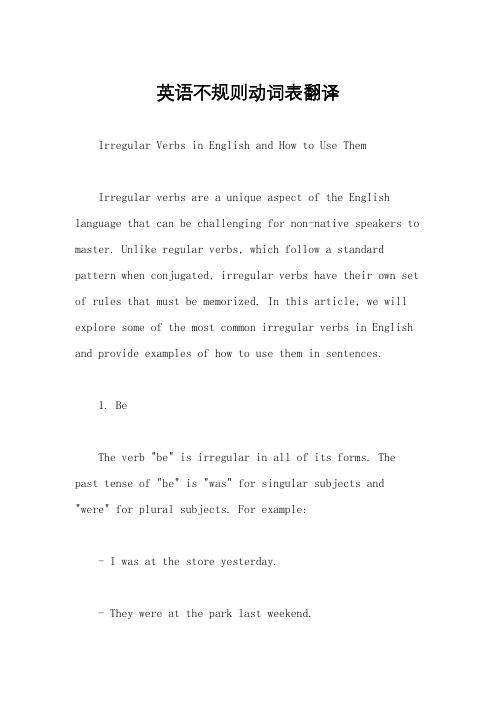
英语不规则动词表翻译Irregular Verbs in English and How to Use ThemIrregular verbs are a unique aspect of the English language that can be challenging for non-native speakers to master. Unlike regular verbs, which follow a standard pattern when conjugated, irregular verbs have their own set of rules that must be memorized. In this article, we will explore some of the most common irregular verbs in English and provide examples of how to use them in sentences.1. BeThe verb "be" is irregular in all of its forms. The past tense of "be" is "was" for singular subjects and "were" for plural subjects. For example:- I was at the store yesterday.- They were at the park last weekend.2. HaveThe past tense of "have" is "had." For example: - She had a great time at the party.- We had dinner at a nice restaurant.3. DoThe past tense of "do" is "did." For example: - He did his homework last night.- Did you see the movie?4. GoThe past tense of "go" is "went." For example: - She went to the beach on Saturday.- They went on a trip to Europe last summer.5. EatThe past tense of "eat" is "ate." For example:- I ate lunch at noon.- They ate dinner at a fancy restaurant.6. DrinkThe past tense of "drink" is "drank." For example: - She drank a glass of water.- We drank coffee in the morning.7. SeeThe past tense of "see" is "saw." For example:- I saw my friend at the mall.- They saw a beautiful sunset.8. TakeThe past tense of "take" is "took." For example: - She took the bus to work.- We took a trip to the mountains.9. WriteThe past tense of "write" is "wrote." For example: - He wrote a letter to his grandmother.- They wrote a report for school.10. BreakThe past tense of "break" is "broke." For example: - She broke her phone.- I broke my arm last year.11. DriveThe past tense of "drive" is "drove." For example: - He drove to the airport.- They drove across the country.12. SpeakThe past tense of "speak" is "spoke." For example: - She spoke to the manager.- We spoke to our neighbors.13. RunThe past tense of "run" is "ran." For example: - I ran five miles yesterday.- They ran in a marathon.14. SingThe past tense of "sing" is "sang." For example: - She sang a song at the concert.- We sang in the choir.15. SwimThe past tense of "swim" is "swam." For example: - He swam in the pool.- They swam in the ocean.16. GiveThe past tense of "give" is "gave." For example: - She gave me a present.- We gave money to charity.17. TakeThe past tense of "take" is "took." For example: - He took the train to work.- They took a vacation to Hawaii.18. BreakThe past tense of "break" is "broke." For example:- She broke her pencil.- I broke a dish.19. ChooseThe past tense of "choose" is "chose." For example:- He chose the blue shirt.- They chose a movie to watch.20. FlyThe past tense of "fly" is "flew." For example:- She flew to Paris.- We flew on a plane.Learning and memorizing irregular verbs is an importantpart of mastering the English language. By understanding the past tense forms of these verbs and how to use them in sentences, non-native speakers can improve their fluency and communication skills. Practice using these irregular verbs in everyday conversations and writing to become more comfortable with them. With time and effort, irregular verbs will become second nature, and non-native speakers will be able to use them confidently and accurately.。


陌生人的善意迈克·麦金太尔一年夏天,我从家乡加利福尼亚州的塔霍城开车前往新奥尔良。
在沙漠深处,我碰到一个年轻人站在路旁。
他一只手打出拇指向外的手势,另一只手里拿着一个汽油罐。
我直接从他身边开过去了。
别人会停下来的,我想。
再说,那汽油罐只是个让车停下、好抢劫司机的幌子而已。
在这个国家,曾有那么一段时间,你要是对需要帮助的人置之不理,大家会认为你是混蛋,而如今你要是帮了你就是笨蛋。
到处潜伏着犯罪团伙、吸毒上瘾者、杀人犯、强奸犯、盗窃犯还有劫车犯,为什么要冒险呢“我不想卷进去”已经成为全国性的信条。
2 开过了几个州以后,我还在想着那个想搭便车的人。
把他一个人留在沙漠中倒并没有让我有多么不安。
让我不安的是,我多么轻易地就做出了这个决定。
我甚至根本没把脚从油门上抬起来。
我很想知道,现在还有人会停车吗3 我想到我此行的目的地——新奥尔良。
那里是田纳西·威廉姆斯的剧作《欲望号街车》的背景地。
我回想起布兰奇·杜波依斯的名句:“我总是依赖陌生人的善意。
”4 陌生人的善意。
听起来好怪。
如今这年头还有谁能指望陌生人的善意吗5 要验证这一点,一个办法是一个人从东海岸旅行到西海岸,不带一分钱,完全依靠美国同胞的善意。
他会发现一个什么样的美国谁会给他饭吃、让他歇脚、捎他一程呢6 这个念头激起了我的好奇心。
但谁会这么不切实际、愿意去尝试这样一次旅行呢好吧,我想,那不如我来试试7 满37岁那个星期,我意识到我这辈子还从没冒过什么险呢。
所以我决定来个观念的跨越,美洲大陆那么宽——从太平洋去大西洋,不带一分钱。
要是有人给我钱,我会拒绝。
我只接受搭顺风车、提供食物和让我歇脚的帮助。
这将是穿越这片金钱至上的土地上一次无钱的旅行。
我的最终目的地是北卡罗来纳州的“恐惧角”(即开普菲尔),它象征着我沿途必须克服的所有恐惧。
8 1994年9月6日,我早早起床,背起一个50磅重的包,朝金门桥走去。
我从背包里拿出一个牌子,向过路的车辆展示我的目的地:“美利坚”。
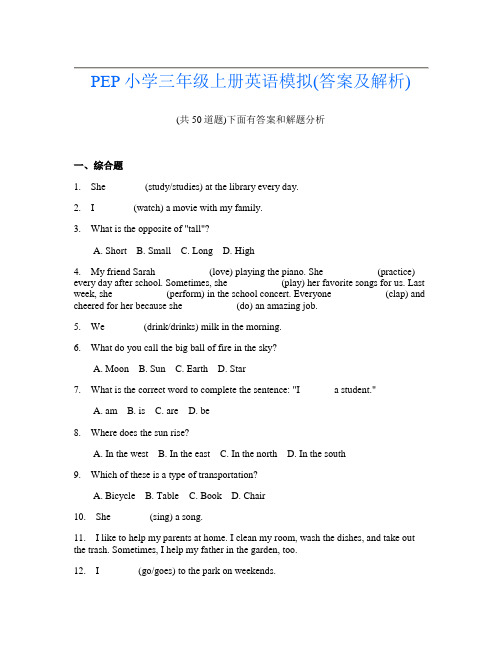
PEP小学三年级上册英语模拟(答案及解析)(共50道题)下面有答案和解题分析一、综合题1.She _______ (study/studies) at the library every day.2.I _______ (watch) a movie with my family.3.What is the opposite of "tall"?A. ShortB. SmallC. LongD. High4.My friend Sarah __________ (love) playing the piano. She __________ (practice) every day after school. Sometimes, she __________ (play) her favorite songs for us. Last week, she __________ (perform) in the school concert. Everyone __________ (clap) and cheered for her because she __________ (do) an amazing job.5.We _______ (drink/drinks) milk in the morning.6.What do you call the big ball of fire in the sky?A. MoonB. SunC. EarthD. Star7.What is the correct word to complete the sentence: "I ______ a student."A. amB. isC. areD. be8.Where does the sun rise?A. In the westB. In the eastC. In the northD. In the south9.Which of these is a type of transportation?A. BicycleB. TableC. BookD. Chair10.She _______ (sing) a song.11.I like to help my parents at home. I clean my room, wash the dishes, and take out the trash. Sometimes, I help my father in the garden, too.12.I _______ (go/goes) to the park on weekends.13.We _______ (can / could / will) meet tomorrow.14.I ______ (do) my homework every day after school. My homework ______ (be) usually math and English. Yesterday, I ______ (finish) my homework early, so I ______ (watch) a movie with my family. It ______ (be) a fun movie.15.Which of these is a part of your face?A. EarB. FingerC. KneeD. Foot16.He _______ (study) English every day.17.Which of these is a musical instrument?A. GuitarB. SpoonC. KnifeD. Plate18.David is playing soccer with his friends. They are having a great time. David kicks the ball __________ and his friend Mark tries to __________ it. The game is very__________, and everyone is running and trying to score goals. Finally, David scores the winning __________ and everyone cheers.19.Which one is used to clean the floor?A. MopB. KnifeC. SpoonD. Plate20.Which one is used to tell the time?A. WatchB. ChairC. BookD. Lamp21.Sally is preparing her school bag for tomorrow. She puts her __________ (1) in first, followed by her __________ (2), some __________ (3), and a __________ (4) for writing. Sally also adds a __________ (5) for keeping notes and her lunchbox for the day.22.I _______ (study) for the test every evening.23.Which word is used for greeting people?A. GoodbyeB. HelloC. PleaseD. Thank you24.Which of these is not a fruit?A. BananaB. AppleC. CarrotD. Orange25.Which one is a body part?A. ArmB. SpoonC. KnifeD. Table26.My brother _______ (read) a book now.27.She _______ (not/like) to watch TV.28.Which of these animals is a mammal?A. FishB. BirdC. WhaleD. Lizardst week, I __________ (1) a movie with my family. The movie __________ (2) very exciting, and we __________ (3) a great time. After the movie, we __________ (4) to a nearby restaurant and __________ (5) some delicious food. I __________ (6) pizza, and my brother __________ (7) pasta. We __________ (8) home at 9 p.m. and__________ (9) to bed.30.They _______ (play / plays / played) basketball after school.31.What do you use to cook food?A. KnifeB. StoveC. ShoesD. Pillow32.I _______ (go) to school by bike every morning.33.I _______ (watch) cartoons on Saturdays.34.What do we use to eat pizza?A. ForkB. SpoonC. KnifeD. Hands35.They _______ (eat) pizza for lunch.36.Which of these is used for measuring time?A. ClockB. SpoonC. KnifeD. Plate37.Fill in the blank with the correct preposition: We will meet _______ the library at 3 p.m. We need to bring all _______ our books and notes to the meeting. The meeting will be held _______ the third floor of the building.38.She _______ (be) my best friend.39.They _______ (is / are / were) talking in the classroom.40.I like to __ in the morning because it helps me feel __. After that, I have a __ with eggs, toast, and __. At school, we learn about different __ like math and science. In the afternoon, I play __ with my friends.41.My sister _______ (read) books every day.42.We _______ (eat / eats / eating) breakfast at 7:00 a.m.43.Lily and her family are at the beach. They are building a __________ (1) with some __________ (2). After building, they go for a __________ (3) in the water. Later, Lily’s dad takes a picture with his __________ (4).44.I __________ (1) a test last week. It __________ (2) very difficult, but I__________ (3) it. I __________ (4) the answers carefully and __________ (5) all the questions right.45.I _______ (take) a walk every morning.46.My dad is a great cook. He loves making __ on weekends. Sometimes, he also grills __ for dinner. I always help him set the table and prepare the __. After the meal, we have fruit salad for dessert.47.I _______ (go) to school by bike every day.48.My friend, Lily, ________ (love) to sing. She ________ (sing) in the school choir. Last year, she ________ (perform) in a big concert. It ________ (be) amazing!49.He _______ (make) a cake for his birthday.50.Which of the following sentences uses the correct verb form in the present continuous tense for the subject "I"?A. I am go to school.B. I am going to school.C. I going to school.D. I goes to school.(答案及解释)。


英语学习中的语法要点English Grammar Essentials in Language LearningIn the process of learning a new language, grammar plays a vital role in enabling learners to communicate effectively. English grammar, in particular, has its own set of rules and structures that learners must grasp. This article aims to provide key points and tips on mastering English grammar in language learning.1. Understanding Parts of SpeechIn English grammar, words are categorized into different parts of speech, each serving a specific function in a sentence. These parts include nouns, verbs, adjectives, adverbs, pronouns, prepositions, conjunctions, and interjections. It is crucial to understand the role of each part of speech and how they interact within a sentence.2. Noun-Verb AgreementNouns and verbs must agree in terms of number and person. Singular nouns are paired with singular verbs, while plural nouns require plural verbs. Additionally, the subject-verb agreement should be maintained when using pronouns.3. Tenses and Verb FormsEnglish verbs have various tenses and forms that convey different time frames and aspects. It is essential to familiarize oneself with common verb tenses such as present, past, and future, as well as perfect and progressiveforms. Practice is key to mastering verb conjugation and using the correct tense in sentence construction.4. Sentence StructureUnderstanding the basic structure of English sentences is fundamental to effective communication. A standard English sentence follows the subject-verb-object (SVO) pattern. However, the order can vary depending on the emphasis or the type of sentence (e.g., interrogative, imperative). Knowing how to construct sentences ensures clarity and coherence in written and spoken English.5. Modifiers and AdjectivesAdjectives modify nouns, providing additional information and describing their qualities. It is important to understand the proper placement and agreement of adjectives within a sentence. Furthermore, adverbs function similarly by modifying verbs, adjectives, or other adverbs. Mastery of modifiers enhances the quality and precision of language use.6. Pronouns and Their UsagePronouns replace nouns in a sentence, simplifying language and avoiding repetition. Knowledge of pronoun types (personal, possessive, reflexive, demonstrative, etc.) and their correct usage is crucial for effective communication. Pronouns must agree with the noun they replace in terms of gender, number, and person.7. Conditional SentencesConditional sentences express hypothetical or imaginary situations, and mastering their structure is essential. These sentences are constructed using conditional clauses (if-clauses) and result clauses. Understanding the different types of conditionals (zero, first, second, third) and their corresponding verb forms is crucial in conveying specific meanings accurately.8. Articles and DeterminersArticles (a, an, the) and determiners (this, that, these, those) help to specify nouns and indicate their specificity or generality. Understanding when and how to use articles and determiners correctly is vital for conveying precise meaning and avoiding ambiguity.9. Prepositions and Prepositional PhrasesPrepositions indicate relationships between nouns, pronouns, or other words in a sentence. Mastering the appropriate prepositions and prepositional phrases is crucial to expressing location, time, direction, and other spatial or temporal relationships accurately.10. Word Order and Sentence PunctuationEnglish follows a specific word order, and understanding this order is vital for constructing grammatically correct sentences. Additionally, proper punctuation (commas, periods, question marks, etc.) aids in conveying meaning and maintaining clarity in writing.In conclusion, mastering English grammar is crucial for effective communication in the language. By understanding the key points discussed above, language learners can improve their grammatical accuracy andenhance their language proficiency. However, it is important to remember that grammar should be learned in context and through consistent practice, integrating it into all language skills: reading, writing, listening, and speaking. So, keep practicing and exploring the intricacies of English grammar to become a confident and proficient English speaker.。

Unit 2 Making a differenceUsing language【教材分析】The grammar section of this unit focuses on the verb-ed form as attributive. Students will understand how a verb-ed form or a verb-ed phrase can be used as attributive like an adjective. Meanwhile, students are expected to learn how to use the verb-ed form in two different situations. That is, a verb-ed form before a noun or a verb-ed phrase followed a noun. Furthermore, they will correctly apply the usage to fulfilling some written tasks.In the vocabulary learning section, students will learn words used to describe personal qualities and talk about people’s characteristics using positive, neutral or negative adjectives.In the listening section, students will learn how to make a phone enquiry. While listening, students are expected to complete different listening tasks by taking notes of key detailed information.【教学目标】1. Help students master the basic usage of the past participle and use the past participle instead of the attributive clauses.2. Guide students to use proper adjectives to describe personal qualities in conversations.3. Help students develop their listening ability and learn how to make a phone enquiry as a volunteer.4. Lead students to learn about voluntary work and strengthen their sense of social responsibility.【教学重难点】1. Guide students to discover and summarize the rules of using the past participle.2. Lead students to learn more vocabulary to describe personal qualities and apply the relevant words to interpersonal communication.3. Develop students’ listening skills to get key information in listening and complete a registration form.【教学过程】Step 1 Grammar: -ed as attributive1. Help students identify the part of speech of the verb-ed form in the following sentences.Notes: The verb-ed forms are used as adjectives to modify the nouns when they appear before nouns.2. Identify the part of speech of the verb-ed form in the following sentences.Notes: (1) A verb-ed phrase is used after a noun to modify the noun like an attribute clause.(2) The verb-ed form can express the passive meaning or the past meaning.3. Change the verb-ed form in the sentences above into attributive clauses.⑤In Uganda, Ryan at last saw the well , which was finished, with his own eyes.⑥Many people, who were inspired, gave him their support.⑦Ryan had troubled believing the words, which were spoken by his teacher.⑧ A well, which was built near a primary school in Uganda, cost $2000.4. Guide students to summarize the usage of attributive in the past participle form.(1) The verb-ed form are used before nouns as adjectives to modify the nouns like attribute clauses.(2) The verb-ed phrases are used after nouns to modify the nouns like attribute clauses.(3) The verb-ed form can express the passive meaning or the past meaning.Step 2 Practice1. Students read the discussion about Ryan’s foundation and rewrite the underlined sentences with the -ed form.2. Read the passage on Page 17 and use the correct form of the words to complete the following sentences. Students are supposed to distinguish verb-ed from verb-ing correctly.①The United Nations Children’s Fund, also _________(know) as UNICFF, is a UN organization __________ (base) in New York.②It offers help _________ (need) by children all over the world.③UNICEF was founded in 1946, to provide food and healthcare to children in countries _________ (damage) in World War II.④Since 1953, UNICEF has taken up an extended mission to help children in the _______(develop) world, including those ________ (live) with diseases or disabilities and those ________ (affect) by rapid modernization and environmental problems. Step 3 Learn vocabulary and talk about personal qualities1. Read the descriptions on Page 18 and find out the words describing personal qualities.2. Categorize vocabulary according to different emotional colours and add moreStep 4 Listening1. Before listening, guide students to read “Did you know?” so that students learn about charity work in some different countries. Students are expected to focus on voluntary work for charity.2. Read “Learning to learn”, which helps students better get information from listening.Step 5 While listening1. Listen to the phone enquiry for the first time and complete the sentences.①Sarah likes __________________________.②The man suggests __________________________.③Erica Marshall needs to know __________________________.2. Play the audio again. Students should take notes of the necessary information3. After checking the answers, have students talk about how Sarah makes a phone enquiry on becoming a volunteer.Step 6 Post-listening1. Work in pairs. Think about a voluntary work you would like to be involved in and make a conversation similar to a telephone enquiry.2. Then encourage students to act out the telephone enquiry to the whole class. Step 7 Language appreciation1. He’s sensitive and rather serious, which sometimes makes him appear to be a little bookish.[句式分析]句子“which sometimes makes him appear to be a little bookish”是有关系代词which引导的“非限制性定语从句”修饰前面的主句;从句中appear意为“似乎,好像”,是一个“连系动词”(词性),后接动词常常用带to的不定式。
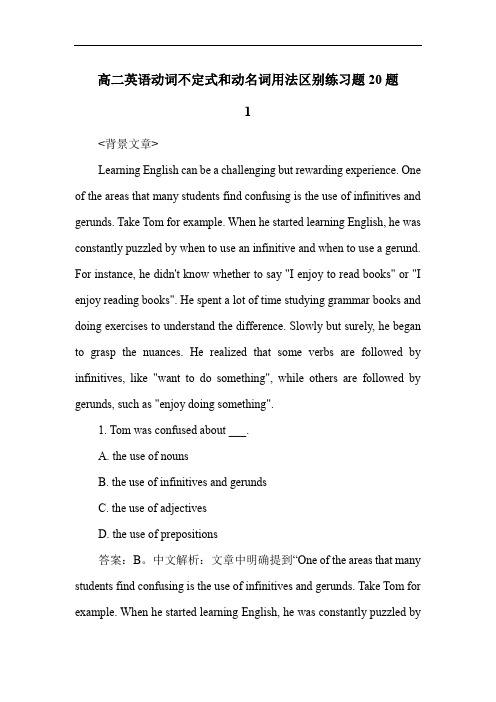
高二英语动词不定式和动名词用法区别练习题20题1<背景文章>Learning English can be a challenging but rewarding experience. One of the areas that many students find confusing is the use of infinitives and gerunds. Take Tom for example. When he started learning English, he was constantly puzzled by when to use an infinitive and when to use a gerund. For instance, he didn't know whether to say "I enjoy to read books" or "I enjoy reading books". He spent a lot of time studying grammar books and doing exercises to understand the difference. Slowly but surely, he began to grasp the nuances. He realized that some verbs are followed by infinitives, like "want to do something", while others are followed by gerunds, such as "enjoy doing something".1. Tom was confused about ___.A. the use of nounsB. the use of infinitives and gerundsC. the use of adjectivesD. the use of prepositions答案:B。

六年级上册英语大数据In the first semester of sixth grade, students typically learn a wide range of English language skills, from basic grammar and vocabulary to reading comprehension and writing. Some common topics covered in this semester include:1. Parts of speech: Students will learn about the different parts of speech, including nouns, verbs, adjectives, adverbs, pronouns, prepositions, and conjunctions. They will learn how to identify these parts of speech in sentences and how to use them correctly in their own writing.2. Singular and plural nouns: Students will learn the rules for changing singular nouns to plural form and vice versa. They will practice using plural nouns in sentences and identifying them in reading passages.3. Subject-verb agreement: Students will learn how to make the verb in a sentence agree with the subject (i.e., singular or plural). They will practice changing verbs to match the subject in different sentences.4. Simple present tense: Students will learn how to use the simple present tense to talk about actions that happen regularly or habits. They will practice using this tense in affirmative, negative, and interrogative sentences.5. Reading comprehension: Students will practice reading short passages and answering questions about the main idea, details, and vocabulary. They will learn strategies for understanding newwords and using context clues to figure out the meaning of unfamiliar words.6. Writing: Students will practice writing short paragraphs and essays on various topics. They will learn how to organize their writing, use descriptive vocabulary, and write with proper grammar and punctuation.Overall, the goal of sixth-grade English is to provide students with a solid foundation in the language skills they will need to succeed in middle school and beyond. By mastering the basics of grammar, vocabulary, reading comprehension, and writing, they will be well-prepared for the challenges ahead.。
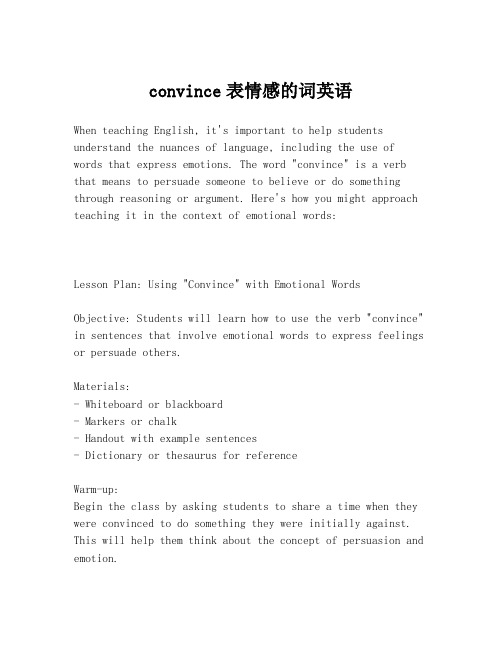
convince表情感的词英语When teaching English, it's important to help students understand the nuances of language, including the use of words that express emotions. The word "convince" is a verb that means to persuade someone to believe or do something through reasoning or argument. Here's how you might approach teaching it in the context of emotional words:Lesson Plan: Using "Convince" with Emotional WordsObjective: Students will learn how to use the verb "convince" in sentences that involve emotional words to express feelings or persuade others.Materials:- Whiteboard or blackboard- Markers or chalk- Handout with example sentences- Dictionary or thesaurus for referenceWarm-up:Begin the class by asking students to share a time when they were convinced to do something they were initially against. This will help them think about the concept of persuasion and emotion.Direct Instruction:1. Definition: Start by defining the verb "convince." Explain that it means to cause someone to believe something or do something through reasoning or argument.2. Emotional Context: Discuss how emotions can play a role in convincing someone. For example, appealing to someone's feelings of compassion, empathy, or desire can be a powerful tool in persuasion.3. Example Sentences: Write the following sentences on the board and discuss the emotional words used in each:- "She was convinced by his heartfelt plea to help the homeless."- "The passionate speech convinced the audience to donate to the charity."- "His convincing argument, filled with emotion, swayed the voters."4. Grammar Focus: Highlight the structure of sentences using "convince." Point out that "convince" is typically followed by an object (the person being convinced) and an infinitive verb phrase (what they are being convinced to do).5. Vocabulary Expansion: Introduce a list of emotional words that can be used to enhance the persuasive power of sentences using "convince." Words like "heartfelt," "passionate," "compelling," "poignant," "emotional," and "touching" can add depth to the sentences.Guided Practice:Divide students into pairs and have them create their own sentences using "convince" and at least one emotional word from the list provided. Encourage them to think about how the emotional words can make their sentences more persuasive.Independent Practice:After the guided practice, assign each student to write a short paragraph where they use "convince" in the context of a story or scenario involving emotions. They should aim to use at least two emotional words in their paragraph.Closure:End the class by reviewing the sentences and paragraphs written by the students. Provide feedback on their use of "convince" and emotional words, and discuss any common mistakes or areas for improvement.Homework:Ask students to find examples of "convince" used in a newspaper article, a book, or a movie dialogue where emotional words are used to persuade. They should analyze how the emotional words contribute to the effectiveness of the persuasion.This lesson plan is designed to help students understand how to use the verb "convince" in conjunction with emotional words to create more impactful and persuasive language.。
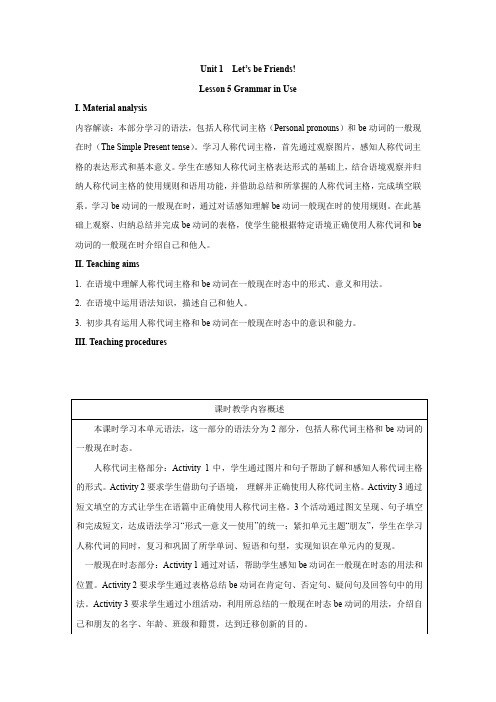
Unit 1 Let’s be Friends!
Lesson 5 Grammar in Use
I. Material analysis
内容解读:本部分学习的语法,包括人称代词主格(Personal pronouns)和be动词的一般现在时(The Simple Present tense)。
学习人称代词主格,首先通过观察图片,感知人称代词主格的表达形式和基本意义。
学生在感知人称代词主格表达形式的基础上,结合语境观察并归纳人称代词主格的使用规则和语用功能,并借助总结和所掌握的人称代词主格,完成填空联系。
学习be动词的一般现在时,通过对话感知理解be动词一般现在时的使用规则。
在此基础上观察、归纳总结并完成be动词的表格,使学生能根据特定语境正确使用人称代词和be 动词的一般现在时介绍自己和他人。
II. Teaching aims
1. 在语境中理解人称代词主格和be动词在一般现在时态中的形式、意义和用法。
2. 在语境中运用语法知识,描述自己和他人。
3. 初步具有运用人称代词主格和be动词在一般现在时态中的意识和能力。
III. Teaching procedures
IV. Blackboard design。

英语关于过去式的作文The past tense is an essential part of the English language. It is used to describe actions or events that have already happened. In this essay, I will discuss the rules for forming the past tense and provide examples of how to use it in sentences.The past tense is formed by adding -ed to the base form of regular verbs. For example, the past tense of the verb "walk" is "walked." However, irregular verbs have different forms in the past tense. For example, the past tense of the verb "go" is "went" and the past tense of the verb "eat" is "ate."The past tense is used to describe actions or events that have already happened. It is often used instorytelling or when describing historical events. For example, "I walked to the store yesterday" or "The American Revolution began in 1775."The past tense is also used to describe habits or actions that occurred regularly in the past. For example, "I used to walk to the store every day" or "She always ate breakfast at 7 am."In addition, the past tense can be used to describe hypothetical or imaginary situations. For example, "If I won the lottery, I would buy a new car" or "She wished she had studied harder for the exam."It is important to note that the past tense can also be used in conjunction with other tenses to create more complex sentences. For example, "I had walked to the store before it started raining" or "She will have eaten breakfast by the time we arrive."In conclusion, the past tense is an important aspect of the English language. It is used to describe actions or events that have already happened and can be formed by adding -ed to regular verbs or using the irregular forms of irregular verbs. It is essential for effective communication in both written and spoken English.。
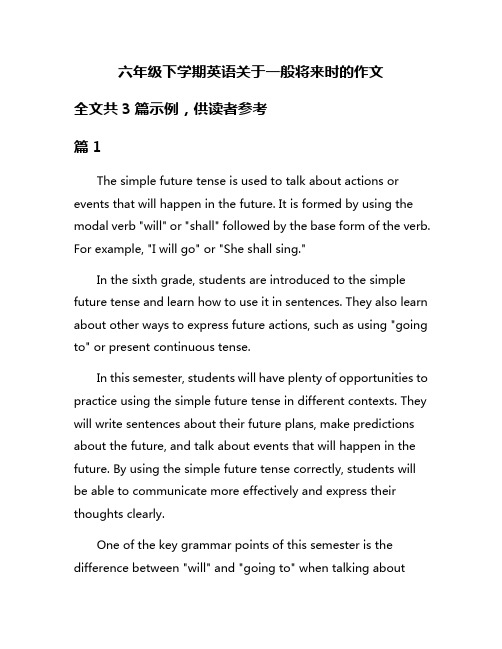
六年级下学期英语关于一般将来时的作文全文共3篇示例,供读者参考篇1The simple future tense is used to talk about actions or events that will happen in the future. It is formed by using the modal verb "will" or "shall" followed by the base form of the verb. For example, "I will go" or "She shall sing."In the sixth grade, students are introduced to the simple future tense and learn how to use it in sentences. They also learn about other ways to express future actions, such as using "going to" or present continuous tense.In this semester, students will have plenty of opportunities to practice using the simple future tense in different contexts. They will write sentences about their future plans, make predictions about the future, and talk about events that will happen in the future. By using the simple future tense correctly, students will be able to communicate more effectively and express their thoughts clearly.One of the key grammar points of this semester is the difference between "will" and "going to" when talking aboutfuture plans. While "will" is used for decisions made at the moment of speaking, "going to" is used for plans or intentions that have already been made. Students will practice distinguishing between the two and using the correct form in sentences.In addition to the simple future tense, students will also learn about other ways to express future actions. They will practice using the present continuous tense to talk about fixed future arrangements and using modal verbs like "may" or "might" to make predictions about the future.Overall, the focus of this semester is to help students become more comfortable using the simple future tense in English. By the end of the semester, students will be able to confidently talk about future plans, make predictions, and express their thoughts about future events using the simple future tense and other related grammar points. With practice and guidance from their teachers, students will master the simple future tense and improve their overall English proficiency.篇2The Future Simple Tense, also known as the Simple Future Tense, is used to talk about actions that will happen in the future.In this tense, we use the modal verb "will" followed by the base form of the verb.For example:- I will finish my homework tomorrow.- She will go to the beach next weekend.- We will visit our grandparents next month.Forming the Simple Future Tense is quite simple. We just need to use the modal verb "will" followed by the base form of the verb. There is no need to change the verb according to the subject.Here are some more examples of using the Simple Future Tense:- They will start their vacation next week.- He will buy a new car soon.- She will cook dinner tonight.It is important to note that we use the Simple Future Tense to make predictions, promises, offers, requests, and decisions made at the moment of speaking.Here are some more examples of using the Simple Future Tense for different purposes:Predictions:- It will rain tomorrow.Promises:- I will call you later.Offers:- I will help you with your project.Requests:- Will you please pass me the salt?Decisions:- I will study harder next semester.In conclusion, the Simple Future Tense is a versatile tense that can be used for various purposes. By using the modal verb "will" followed by the base form of the verb, we can talk about future actions with ease. So, the next time you want to talk about something that will happen in the future, remember to use the Simple Future Tense!篇3The Simple Future TenseIn English, the simple future tense is used to talk about actions or events that will happen in the future. This tense is formed by using the modal verb "will" or "shall" followed by the base form of the verb.For example:- I will go to the store tomorrow. (action)- She will be a doctor when she grows up. (event)There are also a few other ways to talk about the future without using "will" or "shall." Let's take a look at them:1. Going to FutureThe going to future is used to talk about plans and intentions that have already been decided. It is formed by using the verb "to be" in the present tense followed by "going to" and the base form of the verb.For example:- They are going to visit their grandparents next weekend.- I am going to learn a new language this year.2. Present Continuous FutureThe present continuous tense can also be used to talk about future actions that have already been arranged. It is formed by using the verb "to be" in the present tense followed by the present participle of the main verb.For example:- We are meeting Jack for lunch tomorrow.- She is flying to Italy next month.3. Future Perfect TenseThe future perfect tense is used to talk about actions that will be completed by a specific time in the future. It is formed by using the modal verb "will" followed by "have" and the past participle of the main verb.For example:- By the time you arrive, we will have finished dinner.- They will have completed their project by next week.4. Future Perfect Continuous TenseThe future perfect continuous tense is used to talk about actions that will have been ongoing for a specific period of timein the future. It is formed by using the modal verb "will" followed by "have been" and the present participle of the main verb.For example:- By the time you get here, we will have been waiting for an hour.- They will have been studying for the test for three hours by tomorrow.In conclusion, the simple future tense is just one way to talk about the future in English. By using different tenses and structures, you can convey different nuances of time and certainty when discussing future actions and events. Remember to consider the context and purpose of your communication when choosing the most appropriate future tense to use.。
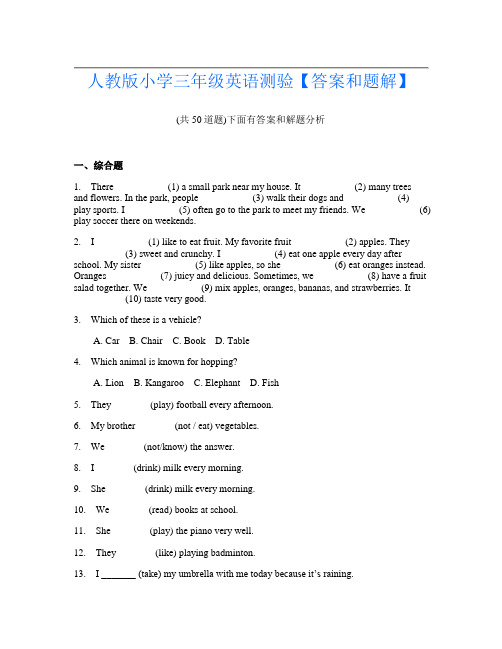
人教版小学三年级英语测验【答案和题解】(共50道题)下面有答案和解题分析一、综合题1.There __________ (1) a small park near my house. It __________ (2) many trees and flowers. In the park, people __________ (3) walk their dogs and __________ (4) play sports. I __________ (5) often go to the park to meet my friends. We __________ (6) play soccer there on weekends.2.I __________ (1) like to eat fruit. My favorite fruit __________ (2) apples. They__________ (3) sweet and crunchy. I __________ (4) eat one apple every day after school. My sister __________ (5) like apples, so she __________ (6) eat oranges instead. Oranges __________ (7) juicy and delicious. Sometimes, we __________ (8) have a fruit salad together. We __________ (9) mix apples, oranges, bananas, and strawberries. It__________ (10) taste very good.3.Which of these is a vehicle?A. CarB. ChairC. BookD. Table4.Which animal is known for hopping?A. LionB. KangarooC. ElephantD. Fish5.They _______ (play) football every afternoon.6.My brother _______ (not / eat) vegetables.7.We _______ (not/know) the answer.8.I _______ (drink) milk every morning.9.She _______ (drink) milk every morning.10.We _______ (read) books at school.11.She _______ (play) the piano very well.12.They _______ (like) playing badminton.13.I _______ (take) my umbrella with me today because it’s raining.14.What do we use to drink water?A. ForkB. SpoonC. CupD. Knife15.My mother __________ (1) a great cook. She __________ (2) delicious meals every day. Yesterday, she __________ (3) a special lunch for us. It __________ (4) chicken, vegetables, and rice. I __________ (5) the food very much. After lunch, we__________ (6) to the garden to water the plants.16.Which of these is used for cutting?A. KnifeB. SpoonC. PlateD. Cup17.She _______ (speak) English very well.18.She _______ (wear) a red dress today.19.We _______ (eat) lunch at school tomorrow.20.I __________ (never/see) a horse before I __________ (go) to the farm last weekend. I __________ (be) excited to see the horses up close. The farmer __________ (tell) me that horses __________ (need) a lot of care.21.I __________ (not/understand) the lesson yesterday, but today I __________ (ask) my teacher for help. She __________ (explain) it again, and I __________ (understand) everything. Now I __________ (feel) much better.22.Which color is a carrot?A. RedB. GreenC. OrangeD. Yellow23.Which one is a body part?A. EyeB. SpoonC. PlateD. Book24.She _______ (go) to the park on Sundays.25.Which of these is a wild animal?A. DogB. LionC. CowD. Sheep26.Which of the following sentences uses the correct verb form in the present continuous tense for the subject "I"?A. I am go to school.B. I am going to school.C. I going to school.D. I goes to school.27.We _______ (take/takes) our lunch to school every day.28.I __________ (not like) the cold weather, so when I __________ (wake) up this morning, I __________ (feel) a little sad. I __________ (put) on a warm coat and__________ (leave) for school. On my way to school, I __________ (see) some children playing in the snow. They __________ (look) very happy, so I __________ (decide) to join them after school.29.We __________ (take) a field trip to the farm last month. We __________ (see) many animals, like cows, chickens, and pigs. We __________ (pick) some apples from the trees, and we __________ (learn) how to milk a cow.30.How many hours are in a day?A. 12B. 24C. 48D. 3631.They _______ (read) a book when I called them.32.Which of these is a season of the year?A. CarrotB. SummerC. BananaD. Dog33.Which one is the opposite of "big"?A. TallB. SmallC. HeavyD. Light34.Every Saturday, I go to the park with my family. We play games like soccer and basketball. My brother is really good at playing soccer. He kicks the ball into the net, and we all cheer. After playing, we sit on the grass and eat sandwiches with some __. Sometimes, we also have __ for dessert.35.In the morning, I ______ (wake) up early and ______ (start) my day with a big breakfast. I usually ______ (eat) cereal with milk and ______ (drink) some orange juice. After breakfast, I ______ (go) to school by bike. It ______ (take) me about 20 minutes to get there. I always ______ (arrive) at school by 8:00 AM.36.Which of these is a kind of bird?A. ParrotB. LionC. DogD. Elephant37.We _______ (eat/eats) breakfast together.38.Which of these is used to clean?A. BroomB. ChairC. TableD. Plate39.He _______ (play) basketball every weekend.40.They _______ (watch) TV in the evening.41.He _______ (study) for the exam now.42.I _______ (walk) to school every morning.43.They _______ (eat) dinner at 7:00 PM.44.This winter, I ________ (buy) a new coat. It ________ (be) very warm and________ (keep) me comfortable on cold days. I ________ (wear) it every day when I ________ (go) outside.45.Which of these is used to wash clothes?A. Washing machineB. SpoonC. PlateD. Chair46.He _______ (play) soccer every Sunday.47.We _______ (watch/watches) movies on Friday evening.48.Which animal has a long neck?A. LionB. GiraffeC. DogD. Tiger49.My friends _______ (not) play soccer in the park.50.My school is very __. It has many classrooms, a big library, and a playground. The playground has swings, a basketball court, and a slide. I like playing on the swings with my friends during recess. We also have a computer lab where we can learn how to use computers.(答案及解释)。
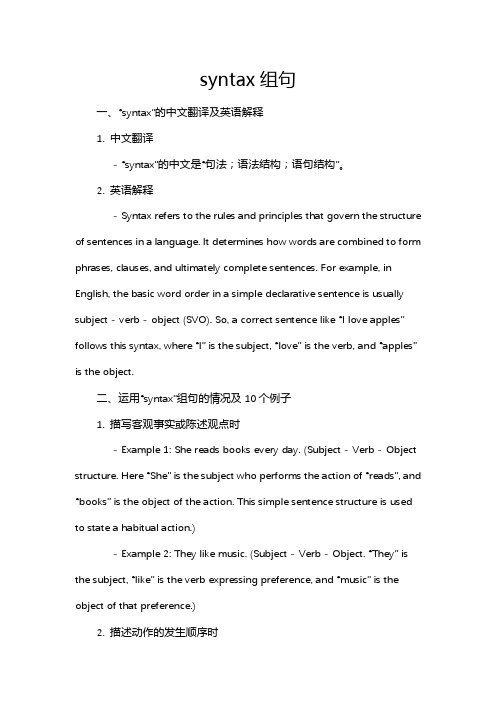
syntax组句一、“syntax”的中文翻译及英语解释1. 中文翻译- “syntax”的中文是“句法;语法结构;语句结构”。
2. 英语解释- Syntax refers to the rules and principles that govern the structure of sentences in a language. It determines how words are combined to form phrases, clauses, and ultimately complete sentences. For example, in English, the basic word order in a simple declarative sentence is usually subject - verb - object (SVO). So, a correct sentence like “I love apples” follows this syntax, where “I” is the subject, “love” is the verb, and “apples” is the object.二、运用“syntax”组句的情况及10个例子1. 描写客观事实或陈述观点时- Example 1: She reads books every day. (Subject - Verb - Object structure. Here “She” is the subject who performs the action of “reads”, and “books” is the object of the action. This simple sentence structure is used to state a habitual action.)- Example 2: They like music. (Subject - Verb - Object. “They” is the subject, “like” is the verb expressing preference, and “music” is the object of that preference.)2. 描述动作的发生顺序时- Example 3: First, he wakes up, then he brushes his teeth. (Here, we use a sequence of simple sentences following the subject - verb - object syntax. “He” is the subject in both sentences, and “wakes up” and “brushes” are the verbs respectively. This shows the order of actions.) - Example 4: After she finishes her work, she goes home. (The main clauses “she goes home” follows the SVO syntax. The sub - clause “After she finishes her work” also has a proper syntax with “she” as the subject, “finishes” as the verb, and “her work” as the ob ject. This is used to show the time sequence of events.)3. 进行人物或事物的特征描述时- Example 5: The dog is big and friendly. (Subject - Verb - Complement. “The dog” is the subject, “is” is the verb, and “big and friendly” is the complement, which describes the c haracteristics of the dog. This syntax is used to give details about the subject.)- Example 6: My sister is smart. (Subject - Verb - Complement. “My sister” is the subject, “is” is the linking verb, and “smart” is the complement that describes the quality of the sister.)4. 表达存在关系时- Example 7: There are many flowers in the garden. (The “there be” structure is a special syntax in English to express existence. “There” is the dummy subject, “are” is the verb, and “many flowers” is the real subject. “In the garden” is the prepositional phrase indicating the location.)- Example 8: There is a book on the table. (Similar to the above, “There” is the dummy subject, “is” is the verb, “a book” is the real subject, and “on the table” is the prepositional phrase showing the loc ation.)5. 构建复合句时(以状语从句为例)- Example 9: When it rains, the ground gets wet. (The “When it rains” is an adverbial clause of time, following the subject - verb syntax with “it” as the subject and “rains” as the verb. The main clause “the ground gets wet” also fol lows the subject - verb - complement syntax. This is used to show the causal relationship between the two events.)- Example 10: Because he is ill, he doesn't go to school. (The “Because he is ill” is an adverbial clause of reason, with “he” as the subj ect, “is” as the verb, and “ill” as the complement. The main clause “he doesn't go to school” follows the subject - verb - object - adverbial structure. This is used to explain the reason for the action in the main clause.)三、个人观点Syntax is of fundamental importance in language learning and communication. A correct understanding and application of syntax rules allow us to form clear, accurate, and effective sentences. It serves as the backbone of language construction, enabling speakers and writers to convey their intended meanings precisely. Moreover, different languages may have different syntactic structures, and learning the syntax of a foreign language can help us gain deeper insights into the way that languagefunctions and the cultural background it reflects. However, while syntax provides the framework, it should not be overly rigidly adhered to in creative writing or in some forms of informal communication, where a certain degree of flexibility can add expressiveness and uniqueness to the language use.。
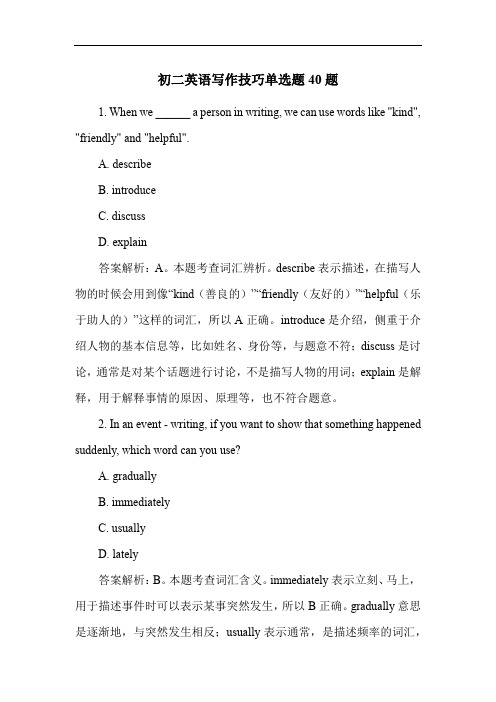
初二英语写作技巧单选题40题1. When we ______ a person in writing, we can use words like "kind", "friendly" and "helpful".A. describeB. introduceC. discussD. explain答案解析:A。
本题考查词汇辨析。
describe表示描述,在描写人物的时候会用到像“kind(善良的)”“friendly(友好的)”“helpful(乐于助人的)”这样的词汇,所以A正确。
introduce是介绍,侧重于介绍人物的基本信息等,比如姓名、身份等,与题意不符;discuss是讨论,通常是对某个话题进行讨论,不是描写人物的用词;explain是解释,用于解释事情的原因、原理等,也不符合题意。
2. In an event - writing, if you want to show that something happened suddenly, which word can you use?A. graduallyB. immediatelyC. usuallyD. lately答案解析:B。
本题考查词汇含义。
immediately表示立刻、马上,用于描述事件时可以表示某事突然发生,所以B正确。
gradually意思是逐渐地,与突然发生相反;usually表示通常,是描述频率的词汇,与突然发生无关;lately是最近,不能表示事件突然发生。
3. When you ______ your opinion in writing, the phrase "in my view" is often used.A. expressB. hideC. changeD. copy答案解析:A。
本题考查词汇搭配。
express one's opinion是表达某人的观点的常用搭配,“in my view 在我看来)”也是用于表达观点时常用的短语,所以A正确。
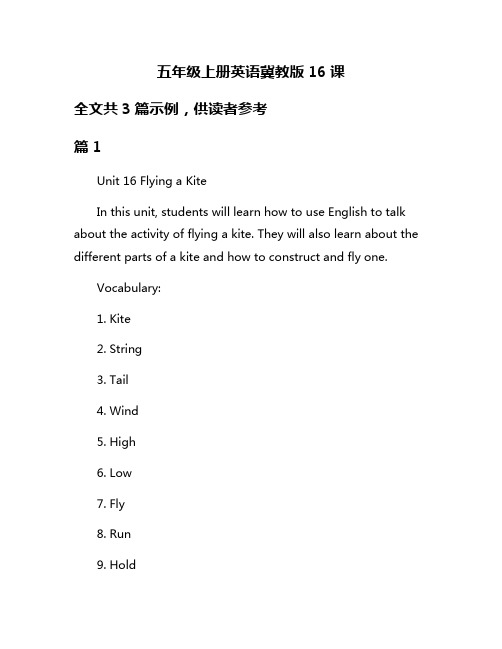
五年级上册英语冀教版16课全文共3篇示例,供读者参考篇1Unit 16 Flying a KiteIn this unit, students will learn how to use English to talk about the activity of flying a kite. They will also learn about the different parts of a kite and how to construct and fly one.Vocabulary:1. Kite2. String3. Tail4. Wind5. High6. Low7. Fly8. Run9. Hold10. Let goDialogue:A: How do you fly a kite?B: First, you need to find an open space with lots of wind. Then, you hold the string tightly and run to let the kite fly high in the sky.A: Wow, that sounds fun!Grammar:1. Present tense verbs: fly, run, hold, let go2. Imperatives: Hold the string, let go of the kite3. Adjectives: high, lowActivities:1. Reading passage about the history of kite flying2. Listening to a dialogue about flying a kite3. Role-playing different scenarios of kite flying4. Writing a paragraph about a kite flying experience5. Constructing and flying kites in the schoolyardAssessment:Students will be assessed on their ability to:1. Understand and use the vocabulary related to kite flying2. Follow and participate in a dialogue about kite flying3. Demonstrate the ability to construct and fly a kite4. Write a coherent paragraph about a kite flying experienceOverall, this unit will provide students with a fun and engaging way to learn and practice their English language skills while enjoying the activity of flying a kite.篇2Unit 16 of Shandong Education Press' English textbook for the fifth grade is titled "What Would You Like for Dinner?" This unit focuses on teaching students how to talk about preferences for food and drinks, as well as how to order food in a restaurant. The unit includes vocabulary related to different types of food and drinks, as well as common phrases and expressions used when dining out.The first part of the unit introduces students to vocabulary related to food and drinks, such as fruits, vegetables, meat, and beverages. Students learn how to identify and name different types of food items, as well as how to describe their taste andtexture. They also learn how to use adjectives to express their preferences and dislikes.In the following lessons, students learn how to ask and answer questions about food preferences. They practice using phrases such as "I like..." and "I don't like...", as well as expressing their opinions about different food items. They also learn how to ask for recommendations and suggestions when choosing a meal.One of the key activities in this unit is a role-playing exercise where students pretend to be customers in a restaurant. They practice ordering food and drinks from a menu, using polite expressions like "I would like..." and "Could I have...?" They also learn how to ask for the bill and say thank you to the waiter or waitress.Overall, Unit 16 of the fifth-grade English textbook is designed to help students improve their communication skills and confidence when talking about food preferences and ordering in a restaurant. By the end of the unit, students should be able to confidently express their likes and dislikes, as well as order a meal in English with ease.篇3Unit 16 of the fifth grade book in the Jilin Edition of English is titled "What Does Your Father Do?" This unit focuses on occupations, describing different jobs that people have and the responsibilities that come with each job.The unit begins with a song called "Hello, Goodbye," which introduces the theme of greetings and farewells. Students learn how to greet people and say goodbye in English, as well as how to introduce themselves and ask for someone's name.Next, students read a short passage about different jobs that people have, such as doctor, teacher, police officer, and farmer. They learn vocabulary related to these occupations and practice using it in sentences. They also learn about the importance of each job and how it helps the community.In the grammar section of the unit, students focus on the present tense of the verb "to be." They learn how to use the verb in sentences to describe someone's occupation, such as "He is a doctor" or "She is a teacher." They also practice asking and answering questions about occupations using the verb "to be."The unit also includes a reading comprehension activity where students read a short passage about a boy named Tom and his father, who is a doctor. Students answer questions about the passage to demonstrate their understanding of the text.In the writing section of the unit, students practice writing about their own family members' occupations. They learn how to describe what their parents do for a living and why their jobs are important.Overall, Unit 16 of the fifth grade book in the Jilin Edition of English provides students with a comprehensive understanding of different occupations and how they contribute to society. Students learn vocabulary, grammar, reading comprehension, and writing skills related to the theme of occupations, helping them develop their English language abilities in a meaningful and engaging way.。

英语语法的学习方法如何学好英文语法?这是困扰初高中、四六级、考研等各阶段英语学习者的问题,。
没有这种事!小编在这里为大家整理了两种不同的的英语与法方法,快来学习学习吧!学习方法一、What do you think of when you hear the word 'grammar'? Does it make you think of complicated textbooks, difficult exercises and boring lessons?当你听到“语法”这个词时,你会怎么想?它会让你想到复杂的课本、困难的练习和枯燥的课程吗?For many English learners, the answer is 'yes'.对许多英语学习者来说,答案是“是”。
Some English learners even tell me "I don't need grammar," or "I don't want to study grammar."一些英语学习者甚至告诉我“我不需要语法”,或者“我不想学语法”。
In this lesson, you're going to see first of all what grammar really is and why you need it. Then, I'll share some advice to make it easier for you to learn and use English grammar.在这节课中,你将首先看到真正的语法是什么,以及你为什么需要它。
然后,我将分享一些建议,让你更容易地学习和使用英语语法。
What is grammar, and why do you need it?什么是语法,你为什么需要它?Grammar is how you organise words into a sentence. Every time you put two or more words together, you are using grammar.语法就是你如何把单词组织成一个句子。
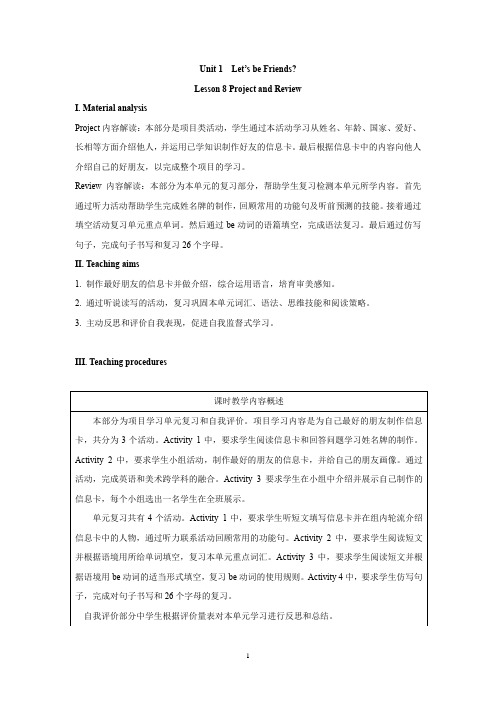
Unit 1 Let’s be Friends?
Lesson 8 Project and Review
I. Material analysis
Project内容解读:本部分是项目类活动,学生通过本活动学习从姓名、年龄、国家、爱好、长相等方面介绍他人,并运用已学知识制作好友的信息卡。
最后根据信息卡中的内容向他人介绍自己的好朋友,以完成整个项目的学习。
Review内容解读:本部分为本单元的复习部分,帮助学生复习检测本单元所学内容。
首先通过听力活动帮助学生完成姓名牌的制作,回顾常用的功能句及听前预测的技能。
接着通过填空活动复习单元重点单词。
然后通过be动词的语篇填空,完成语法复习。
最后通过仿写句子,完成句子书写和复习26个字母。
II. Teaching aims
1. 制作最好朋友的信息卡并做介绍,综合运用语言,培育审美感知。
2. 通过听说读写的活动,复习巩固本单元词汇、语法、思维技能和阅读策略。
3. 主动反思和评价自我表现,促进自我监督式学习。
III. Teaching procedures
IV. Blackboard design。